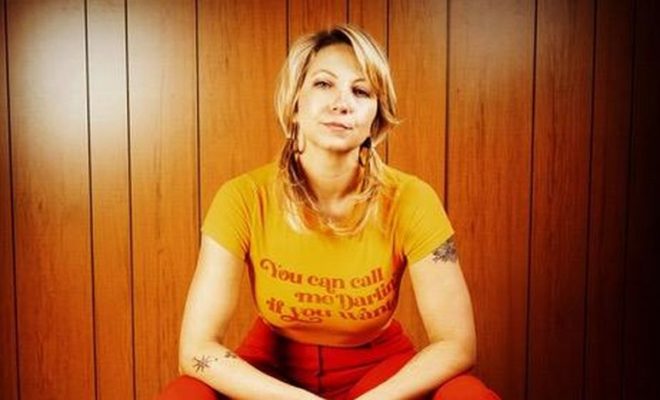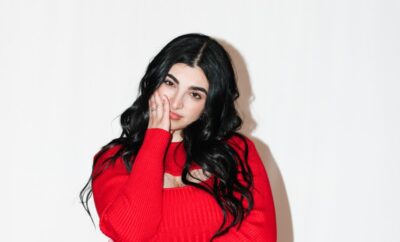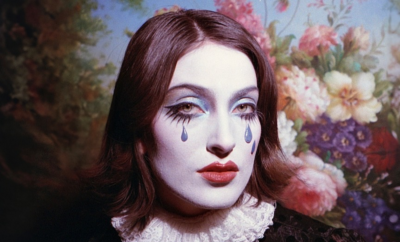
Interviews
Kelley Swindall – You Can Call Me Darlin’ If You Want
By: Ellie Yates
Q) Congratulations on your debut album You Can Call Me Darlin’ If You Want! For those who haven’t had chance to hear it yet, what are some themes you explore?
A) Thank you! I’m very proud of it and stoked it’s finally out!
As for themes… The overarching theme is “matters of the heart” and all that come with it, which to me is what almost all art, at its most basic, is. To expand on that: heartache, heartbreak, loss, longing, deception, cheating, revenge, redemption — all the stuff good country music and the great ballads of old — are made of.
Q) What is your favorite song from the album or one you think people can relate to in particular?
A) Hmmm. I’m going to attempt to provide an answer for the song that I think people can relate to in particular. I feel it’s a toss-up between “You Can Call Me Darlin’ If You Want” and “Refuse to Be Blue.” “Refuse to Be Blue” because everyone has had their heart broken in some form or fashion in their lives and have found themselves in the position of figuring out how they will personally deal with it. “You Can Call Me Darlin’ If You Want” because I think there is a timelessness to it that makes it relatable, if that makes sense, whether a person can personally relate to the experience of the narrator or not.
Q) The single “I Ain’t For You, You Ain’t For Me” is a fierce start to the album. What was the inspiration behind the song?
A) Oh, man. That song is one of the most literal songs on the album in that I sat down and wrote that to a very particular person about a very particular real-life situation in real time that we were both going through together. So, to make a long story short (which is basically what I attempted to do with that song in 3:21 — LOL) I had been living with a person for going on four years when I wrote it. He was an alcoholic and he would get in these states and falsely accuse me of cheating on him. He would get very paranoid and it was hurtful because it was unfounded.
The thing about something like that is the more someone starts to accuse you of something and get you riled up, the more you secretly (or overtly) begin to not only resent them and the accusations, but start to almost want to fulfill these accusations out of spite, which is eventually what I did. We were at the end of our rope and I met someone. Under “normal” circumstances my learned morality would have prevented me from seeing anything through with this new person, but I was so over the barrage of absurd accusations that I decided to go out with a bang. Literally.
The next time he went off and accused me of cheating on him (which, at that point, was happening constantly), I confirmed his fears and broke up with him on the spot and wrote the lyrics of what would become that song right after he stormed out. The act of being unfaithful to him physically was what finally released me from the irrational desire to try to save our relationship and save him from his substance abuse. At that point, I was actually sorry I hadn’t just done it earlier. But, hey, live and learn…and write good songs about it.
Q) What does your songwriting process involve?
A) It almost always involved me and my computer and a guitar. I think and write and rewrite quickly. I find if I try to write on paper, I often can’t read my writing and the cuts and edits make it illegible. I also need to be able to see the whole of the song on the page and it’s easiest to do that — with the amount of words I write — on a computer screen.
As far as approach with the process, it’s always different. I’m sorry to say I’m not very disciplined about it. When I feel an overwhelming urge (more often than not urge equals emotions) that I can’t make sense of rationally, I turn to writing a song to express what and how I’m feeling and — more often than not — to figure out how I’m feeling and what it is I’m trying to say.
A song can take me anywhere from twenty minutes (rare) to a couple years (where I just keep tabling it because I can’t “figure out” what it’s about or how to say what I’m trying to say in song form… until one day it just hits me).
Q) Whilst staying unique, the album has a brilliant classic country sound. Was being a country artist always the dream for you?
A) Not at all! I truly never even dreamed it. I had always wanted to be an actress, which is why I moved to New York City. I had never truly sung-sung before and, while I definitely thought it would be cool to be a singer songwriter or even a singer, I didn’t know or think I had any real talent for either. Then, one day after a break up with a musician, I truly felt compelled to take a stab at writing a song and then performing it (with the intent of him hearing it) and I became obsessed with writing, learning guitar and being performance-ready from that point on.
Q) Who were your favorite artists growing up?
A) Patsy Cline was a big one. Elvis was huge. Jewel was massive. And then any and all Motown and golden oldies (especially The Beach Boys and the Drifters). That was the music I primarily listened to when I was young.
Q) How has these musicians influenced your own sound?
A) The classic country heartfelt crooning delivery, I would say is directly Patsy and a lot of those golden oldies. Jewel’s writing definitely inspired my confessional style of writing.
Q) If you could collaborate with any artist who would it be?
A) Bob Dylan.
Q) I must say I love the video for “California” in which you play all of the characters! Talk about your experiences portraying each one.
A) That was one of my most favorite projects to create, for sure! I love playing different characters and playacting, in general. The idea of it being a “cheesy” (for lack of a better word) throwback silent film gave me so much room to feel like I could just cut loose and be over the top and it would actually serve the video as opposed to take away from it. It was very uplifting and freeing. “Gamblin’ Man” was probably my favorite (though Susannah was damn fun, too). They’re both great characters because they both do what they please and don’t give a damn about how it looks, how they’re perceived or who they hurt along the way. No decent person wants to be that way in real life, but I think we all get a kick out of characters that have the gall and complete lack of self-awareness to be selfish assholes. Like Cartman from “South Park,” he’s the best in an entertainment sense because he’s so awful and that’s the world in which Suzanna and “Gamblin’ Man” inhabit. Totally shameless.
Q) You’re quite active on Social Media. How important do you think this is for keeping in touch with fans, especially in the current circumstances?
A) Oh, man, another good question. It is very important and I have to honestly remind myself of this because it doesn’t come naturally to me. I’m naturally very old school and shy away from “putting it all out there” via social media. It feels strange to me. Now get me in front of a room of real live people and that’s a different story, but with the state of the world and me not being able to get in a room of live human beings, I’ve had to force myself to engage via the internet. Most of the time it’s thrilling and I really enjoy connecting to people this way. In many ways it’s no different because while a physical, in-the-flesh connection isn’t happening, there is still absolutely an energetic and heart-level connection, especially when one engages sincerely. I’ll go through phases where I’m just not motivated to be active, but I have to then remind myself that it is what I make it and how I look at the whole thing, and there’s so much room for positive real connection if I just engage in an authentic and heartfelt manner. That really is everything — especially as an artist whose bread and butter is live performance.
Q) If you could give one piece of advice to aspiring musicians, country or otherwise, what would it be?
A) Go for it and don’t have a back-up plan. The universe has a way of rewarding those who truly follow their heart, work their ass off and don’t take no for an answer. If it’s your passion then it’s worth it. Pursuing your passion — that in itself is so rewarding and enough to get you through the dark days…of which there will be many.
Q) What would you like to say to your fans and those who have supported you throughout your career so far?
A) Thank you. That’s all I really can say. I have so much gratitude for those who have been vocal in their support and love of my music. When you start writing songs (or doing any kind of art, really), you wonder if anyone will really care what you have to say or if you’re just being self-indulgent for putting it out there (that’s just fear speaking, of course). But then when a fan connects and tells you how they listen to your music to get through shit or to lift their spirits, that’s the greatest thing in the world. We all need validation that we have purpose outside of ourselves — whether we want to admit it or not — and to any and every person who has given me that I am beyond grateful.





You must be logged in to post a comment Login